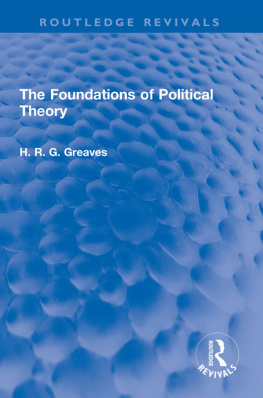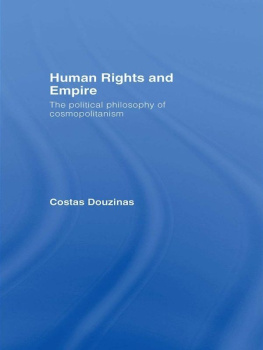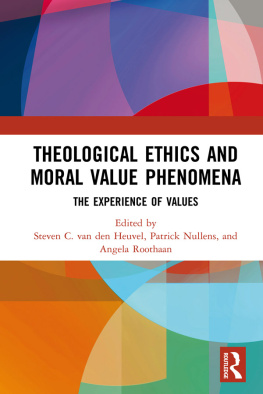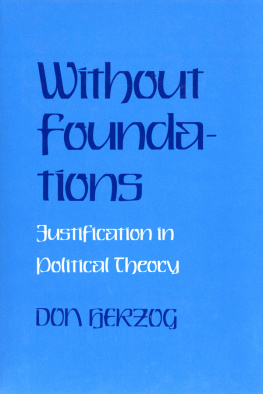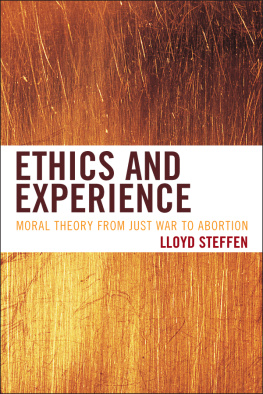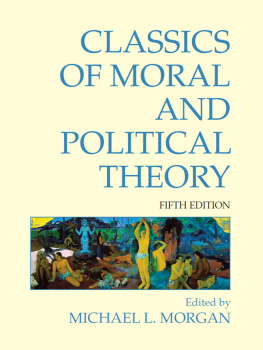Routledge Revivals
The Foundations of Political Theory
First published in 1958, The Foundations of Political Theory strives to answer essential questions of politics by studying its foundations. In this book, Mr. Greaves treats the state as only one among several associations whose function is to promote entirely human ends. He tries to reinterpret such ideas as 'self-realization' and the 'good life' in ways acceptable to students of contemporary philosophy, who reject the theological and metaphysical doctrines these ideas have been tied to in the past. He insists that men get their moral standards and their ideas about what makes life worth living by reflecting on their experience; that there are no ultimate and self-evident moral principles. While admitting that moral standards are subjective in the sense that we cannot explain how men come to have them except by showing how they serve their needs, he refuses to allow that rational argument about them is therefore impossible. Since men are rational, since they have purposes and ideals and not merely desires, and since they know that to realize these purposes they must live with others, there are moral standards acceptable to all men when their function is understood.
The Foundations of Political Theory
H. R. G. Greaves

First published in 1958by George Allen and Unwin Ltd
This edition first published in 2022 by Routledge2 Park Square, Milton Park, Abingdon, Oxon, OX14 4RNand by Routledge605 Third Avenue, New York, NY 10017
Routledge is an imprint of the Taylor & Francis Group, an informa business
George Allen and Unwin Ltd, 1958
All rights reserved. No part of this book may be reprinted or reproduced or utilised in any form or by any electronic, mechanical, or other means, now known or hereafter invented, including photocopying and recording, or in any information storage or retrieval system, without permission in writing from the publishers.
Publisher's Note The publisher has gone to great lengths to ensure the quality of this reprint but points out that some imperfections in the original copies may be apparent.
Disclaimer The publisher has made every effort to trace copyright holders and welcomes correspondence from those they have been unable to contact.
A Library of Congress record exists under LCCN: 59000596
ISBN: 978-1-032-18451-7 (hbk)ISBN: 978-1-003-25460-7 (ebk)ISBN: 978-1-032-18455-5 (pbk)
Book DOI 10.4324/9781003254607
THE FOUNDATIONS OF POLITICAL THEORY
H. R. G. GREAVES
Ruskin House GEORGE ALLEN & UNWIN LTD MUSEUM STREET LONDON
FIRST PUBLISHED IN 1958
This book is copyright under the Berne Convention. Apart from any fair dealing for the purpose of private study, research, criticism or review, as permitted under the Copyright Act, 1956, no portion may be reproduced by any process without written permission. Enquiry should be made to the publisher.
George Allen and Unwin Ltd, 1958
Printed in Great Britain in 11 on 12 pt Baskerville type by Simson Shand Ltd London, Hertford and Harlow
FOREWORD
THE student of politics asks why he should prefer one kind of political organization to another. He wants to know what a political organization should aim at, and by what criteria he is to judge its ends, its methods, and its achievements. He enquires, too, why he should obey, and if there are ever occasions when he should not. These are not 'improper questions', and they will continue to be asked. Political theory must produce guidance on how to deal with them, or perish. That is not to say that it must be able to provide a simple and clear answer, and only one answer, to every practical problem. But it is to say that political theory must show how we should go about their solution, what is the nature of an orderly proceeding in the matter, what considerations ought to be in our minds, whatin shortare its foundations.
This is, then, to deny the view that political science can only describe behaviour without attempting its systematic appraisal, or that the search for unifying concepts or basic principles for general guidance is mistaken and unprofitable. Yet that view is just what there is a growing tendency in recent years to adopt. Were it to become widespread political theory would destroy itself: it would lose its interest to the lay mind and much of its claim to educational usefulness. That it may not be alone in running this risk is suggested by some remarks of the Regius Professor of Modern History, who is reported as having said, in his recent inaugural lecture at Oxford, that classical scholars had killed the classics and that, unless we take heed, there is a danger that philosophers may kill philosophy, philologists literature, and historians history.
But what follows here is only an introductory essay. It is not an attempt at a comprehensive structure. I am concerned with suggesting why, as I think, guiding principles should be sought, and in what manner they should be sought, not with their application over the whole subject. With these wider developments, which belong more exclusively to political science and public administration, I should like to deal later, in what might be a sequel to this introduction.
It is one of the difficulties of the kind of discussion that I have attempted, and a danger for him who undertakes it, that it must trespass upon the preserves of other specialists. Especially do the foundations of political theory lie in the fields of moral philosophy, sociology, and psychology. That, I hope, will explain my treading these preserves, and my frequent borrowing from those to whom they belong. I can only give this necessity as my excuse, and crave the indulgence for my inadequacies of those whose knowledge of these disciplines is greater than mine.
Finally I should like to express my gratitude to the several friends and colleagues who have given me their very generous help. My debt to Professor Morris Ginsberg is evident and deeply felt. I wish also to thank Professor Karl Popper, Mr Leonard Woolf, Professor K. B. Smellie, and Mr Ralph Miliband, for giving me their time and the benefit of their comments at various stages. Their criticism and encouragement has been greatly valued; but none of them must, of course, be blamed for anything that I say or fail to say in what follows. I thank Miss J. Wallis, too, for all her secretarial assistance.
H.R.G.G.London School of Economics and Political ScienceFebruary 1958
CONTENTS
- II Foundations and Criteria
- III Purpose
- IV Obligation and Command
- V Reason and Political Purpose
- VI The Individual and Morality
- VII Sociality and Morality
- VIII The Content of Morality: Rules and Values
- IX The Social Good
- X The State and Social Purpose
- XI Democratic Political Theory: Applications
- II Foundations and Criteria
- III Purpose
- IV Obligation and Command
- V Reason and Political Purpose
- VI The Individual and Morality
- VII Sociality and Morality
- VIII The Content of Morality: Rules and Values
- IX The Social Good
- X The State and Social Purpose
- XI Democratic Political Theory: Applications
Guide
I THE STATE: DEFINITIONS
DOI: 10.4324/9781003254607-1
ARISTOTLE wrote that the state is a creation of nature, and that man is a political animal, meaning that the state is necessary to his satisfactory existence. Augustine saw the source of the state in original sin, man requiring to live under authority in order that his evil tendencies should be restrained. Thrasymachus regarded the state as no more than the rule of the stronger. For Herbert Spencer, in the time of primitive man the state had not come into existence, and he looked forward to a blessed condition in which the state would have ceased to exist, an eventuality in the anticipation of which Marx shared. Hegel described the state as God walking on the earth, and the British idealist philosopher Bosanquet saw the state as the incarnation of a moral order. The late Lord Lindsay described the state as an agreed way of settling differences.

